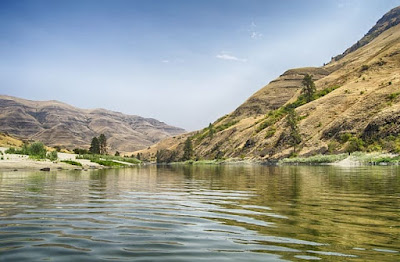A federal regulatory group voted Thursday to officially close king salmon fishing season along much of the West Coast after near-record low numbers of the fish, also known as chinook, returned to California’s rivers last year.
The Pacific Fishery Management Council approved the closure of the 2023 season for all commercial and most recreational chinook fishing along the coast from Cape Falcon in northern Oregon to the California-Mexico border. Limited recreational salmon fishing will be allowed off southern Oregon in the fall.
“The forecasts for Chinook returning to California rivers this year are near record lows,” Council Chair Marc Gorelnik said after the vote in a news release. “The poor conditions in the freshwater environment that contributed to these low forecasted returns are unfortunately not something that the Council can, or has authority to, control.”
Biologists say the chinook salmon population has declined dramatically after years of drought. Many in the fishing industry say Trump-era rules that allowed more water to be diverted from the Sacramento River Basin to agriculture caused even more harm.
The closure applies to adult fall-run chinook and deals a blow to the Pacific Northwest’s salmon fishing industry.
— "U.S. Panel Approves Salmon Fishing Ban For Much Of West Coast," Julie Watson and Lisa Baumann, HuffPost, April 7, 2023
33%- 50% of Earth's fish species risk near-term extinction because of the race for profit and economic growth which must be challenged immediately according to the scientific consensus 🧵 pic.twitter.com/VTHeVaDV1E
— Ben See (@ClimateBen) April 7, 2023
33%- 50% of Earth's insect species risk near-term extinction from within a few decades because of economic growth and the race for profit, both of which therefore must be challenged immediately according to the scientific consensus 🧵 pic.twitter.com/xPfjISCKnE
— Ben See (@ClimateBen) April 6, 2023
25%- 33% of Earth's mammal species risk near-term extinction because of the race for profit and economic growth which must be challenged immediately according to the scientific consensus 🧵 pic.twitter.com/JQfYPXCbPU
— Ben See (@ClimateBen) April 11, 2023
22% of bird species face or are very close to facing extinction due to economic growth which drives habitat destruction via industrial agriculture, logging, etc. However, this conservative figure excludes the severe impacts of highly likely near-term global warming of 2.5/3°C. 🧵 pic.twitter.com/cocRP2TX6u
— Ben See (@ClimateBen) March 31, 2023
BREAKING: European Parliament unanimously supports proposal to enshrine ecocide in European law 🧵 pic.twitter.com/Sq0tv9v7xR
— Ben See (@ClimateBen) April 5, 2023
Someone please tell me if I'm wrong, but I have the impression that the best climate models and projections didn't really have "all the rivers are gonna dry up, like now-ish" in there
— Dave Levitan (@davelevitan) August 28, 2022
"A moment of hope emerges for the endangered Great Salt Lake. Seize it." (unpaywalled) Addison Graham. Washington Post. April 10, 2023.
The fish tried to hide, but now it's on the internet forever. Scientists Find Deepest-Ever Fish, 5 Miles Beneath Ocean's Surface (HuffPost, 6 Apr 2023)
Greed kills. Cape Coral is a planned city, created by tearing down the lush mangroves that provided protection against storms so that every homebuyer could have waterfront property.
— rebekah entralgo (@rebekahentralgo) September 29, 2022
When you borrow that heavily from the environment, the bill comes due.https://t.co/RJhFKjdcKU
"Rich countries ‘trap’ poor nations into relying on fossil fuels": Campaigners criticise ‘new form of colonialism’, where countries in the global south are forced to invest in fossil fuel projects to repay debts. The Guardian. Kaamil Ahmed. 21 Aug 2023. As Jason Hickel commented on this article on Twitter on August 22: "Rich states trap global South countries in debt, forcing them to extract and export fossil fuels (and other resources) to service it. Debt also prevents GS governments from investing in green transition. Climate is a colonial problem. Abolish the debt."
And the colonizer can force the colonized to cut down trees or otherwise abuse the environment.
An environmental and colonial disaster is unfolding in a U.S. colony in the Pacific. Right now, on Guam, hundreds of acres of forest are being destroyed by the U.S. military for a massive live-fire training complex. 🧵
— Slow Factory (@theslowfactory) September 29, 2022
Image by Jim Black from Pixabay





No comments:
Post a Comment